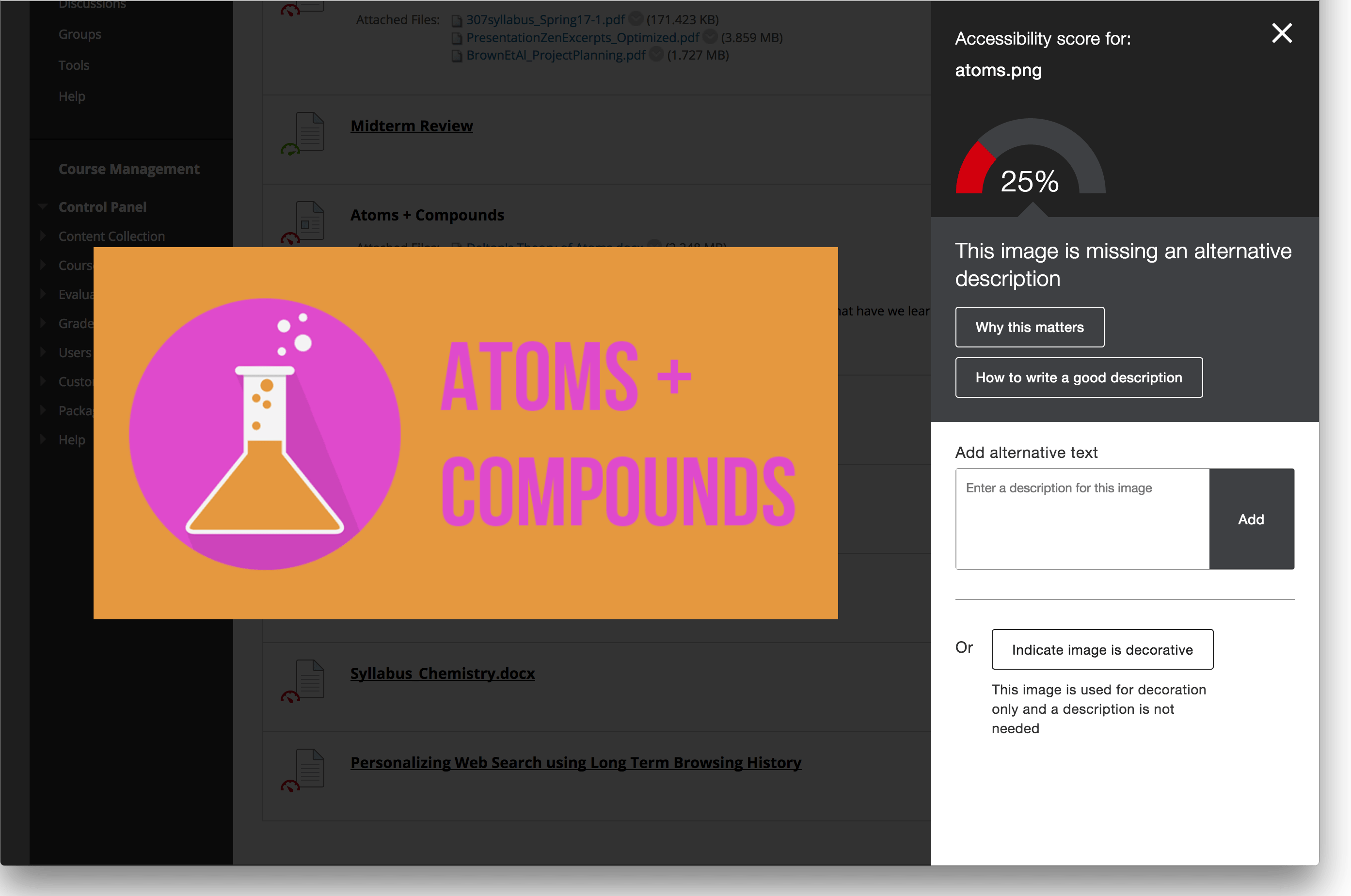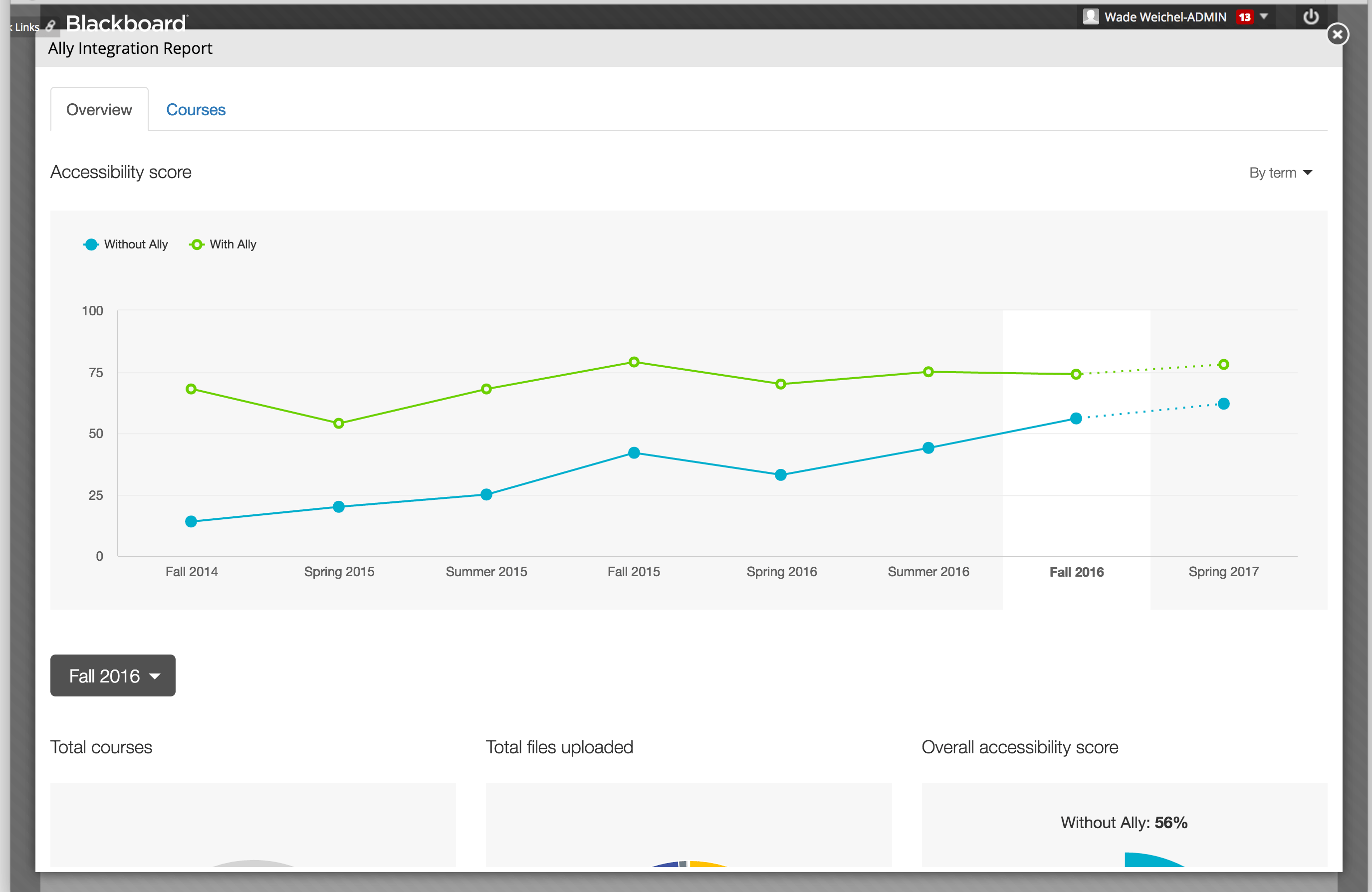 Today we continue the WCET Frontiers series on the 2017 WCET Outstanding Work (WOW) Awards. These awards honor member institutions and organizations that develop technology-based solutions to challenging educational needs.
Today we continue the WCET Frontiers series on the 2017 WCET Outstanding Work (WOW) Awards. These awards honor member institutions and organizations that develop technology-based solutions to challenging educational needs.
We welcome Blackboard to discuss their award winning program Ally. Thank you for your work to increase student success!
Enjoy the read and enjoy the day,
~Lindsey Downs, WCET
Problem: How can institutions tackle the accessibility of their online courses and course materials?
Accessibility is a hot topic in education today for good reason. Thanks to advances in educational technology, we are seeing an increased demand for more options and more flexibility when it comes to how students learn. Up until now, conversations around accessibility were often limited to how accessible the platforms are that students and instructors use, but stopped short when it came to how people interacted with the courses and content in those platforms.
Universal Design for Learning
With such vast amounts of courses and content, where do institutions go from here? It can be difficult not to fall back on a more reactive approach to the challenge of making online courses accessible. This can mean a lot of manual remediation and wait time for the students while alternative formats are created on a request by request basis. This also means more time and resources devoted to retrofitting course material while trying to create new material at the same time. By enabling more flexible and inclusive learning experiences, coupled with a shift in mindset and the implementation of new tools, institutions can take a more universal approach when it comes to online learning. This is where Universal Design for Learning, or UDL, comes into play. Instructors/instructional designers should keep in mind the following key concepts within UDL:
- Equitability – Design your courses to be useful and usable to people with diverse abilities.
- Flexibility – Design your courses to consider a wide range of preferences and abilities.
How can courses be made equitable and flexible? How can these concepts optimize every student’s experience?
Solution: Taking a more proactive, inclusive approach to learning.
Shifting mindset is easier said than done, but moving to a more inclusive approach can be achieved by a small shift and adjustment of standard working routines. For example, consider student engagement in class in the form of a discussion. Some students may feel comfortable speaking up face to face while others may find a virtual classroom setting makes it easier for them to interact with their peers. By providing options, students are provided with equal opportunity to learn in their own style that meets their needs. With this example, universal design has just been incorporated into the course.
As another example, consider PDF materials and how students use them. PDFs can sometimes make up about half of all course material in online courses, but many documents are not always designed to be compatible with screen readers or other assistive technology. In addition, sometimes the documents themselves are scanned or have other issues which make them hard to read or view on another device. Having options and alternatives for these documents from the start can increase the accessibility but also improve the quality and usability of the materials for all students. Not only is this incorporating universal design, it is creating a more inclusive learning environment to enable student success.
Proactive, inclusive approach to learning
This is why we are so excited about Blackboard Ally as another way to help encourage this proactive, inclusive approach to learning. Blackboard Ally was developed to help institutions understand and tackle accessibility in a way that benefits all students. One of the driving forces behind the creation of Ally is the belief that accessibility should not be connected only to disabilities. Accessibility should be about providing better access to everyone and improving the quality of the educational experience for everyone.
How does it work?
Using inclusivity, sustainability and automation as its key pillars, Blackboard Ally integrates seamlessly into the Learning Management System and the workflows that students and instructors already use to help make digital course content more accessible. It does this in three specific ways:
- Alternative Formats – Blackboard Ally will automatically run instructor course materials through an accessibility checklist that checks for common accessibility issues. Using advanced Machine Learning algorithms, Ally will generate a range of more accessible alternatives for the instructor’s original (e.g., audio, ePub, electronic braille) and will make these available to all students in the course.

- Instructor Feedback and Guidance – Using the insight gained from its accessibility checks, Ally will also provide instructors in-context feedback about the accessibility of their course content and guidance on how to fix the identified accessibility issues.

- Institutional Reporting – Blackboard Ally provides an institution-wide course content accessibility report that allows for deep insight and understanding into how the institution is performing and evolving from a course content accessibility point of view.

The Results
The response to Blackboard Ally has been equally exciting. It was recently awarded a 2017 WCET Outstanding Work (WOW) award, which is traditionally given to organizations and institutions that “implement exceptionally creative, technology-based solutions to contemporary challenges in higher education.”
The Ally team works with institutions around the world to continue to gather feedback and improve, and contribute to the momentum and scale that’s required to help institutions make the shift to a more inclusive environment.
If you’re interested in staying up to date on Blackboard Ally, please be sure to sign up for the Ally User group to participate in the discussion.

Nicolaas Matthijs
Product Manager, Blackboard Ally
Institution: Blackboard, Inc.

 Today we continue the WCET Frontiers series on the
Today we continue the WCET Frontiers series on the 



